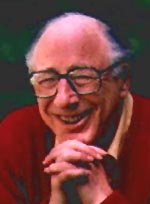Read excerpts of Fred Friendly's letter to David Gullette.
The full transcribed text of Fred Friendly's speech at Quonset as broadcast
over WEAN in Providence:

|
|
Fred Friendly.
|
We are here, Don Morton, seated in the spacious office of Commander Andrew
C. McBall in the beautiful administration building at the air base and we
are talking to you directly from Quonset. Tomorrow morning just about one
hour before the sun hits meridian, that's 11 o'clock, Rear Admiral Edward
C. Calhouse will step before an audience of national and state
dignitaries and begin the commissioning.
On the manicured lawn, before the administration building, Navy officers in
white uniforms and wearing swords and an attachment of marines and enlisted
men of the Navy will hear the rear Admiral turn the Naval base over to the
new Commander. Commander McBall will then read his instructions from the
bureau of navigation and will then order the flag hoisted and the national
anthem played and then this great Naval air base will be a part of the
United States Navy.
South County Rhode Island you know has given the American Navy two vitally
important defenders, two reasons why all the things in Mr. Jefferson's
pursuit of happiness declaration are and will continue to be alive. One
was born in South Kingston in 1785, his name was Oliver Hasard Perry
who took a handful of timber and a few rusty guns and met the enemy and
made them his. Oliver Hasard Perry was born in South Kingston.
The second defender of America from this state will be officially
christened tomorrow morning at 11 O'clock, very close to the birthplace of
Perry, near Wickford at Quonset Point. A mighty city, a gigantic naval
air base will be commissioned.
Thirty million dollars have been spent in Rhode Island in less than a year.
Thirty million dollars for Uncle Sam's defense. Thirty million dollars
worth of cement and steel and asphalt and brick and mortar and sweat to
keep America strong.
Perhaps you've wondered about Quonset, about Boomtown, Rhode Island. Well,
it's an amazing and dramatic story, an epic of America, a saga of adventure
which can best be likened to the work of G.W. Bofalls and Dr. Gogus who
split the earth in two and built the mighty ditch at Panama.
This is Navy history. Strange history perhaps to men of old who believe
that sailors and ships and guns are Navy make, but in 1941 it's more than
than that, it's production. And this is production if ever there was such
a thing.
At West Longitude 71 degrees 25 minutes and North Latitude 41 degrees and
35 minutes on the western side of lovely Narragansett Bay. The bay is
smaller and the state of Rhode Island larger than it was. 11 million yards
of earth have filled the bay and have changed the coastline of our state.
Quonset with its 700 acres of what was once a summer colony is now a city,
a vital one.
Enough asphalt runways to build a two-lane road from here to Boston.
A sewerage plant almost large enough to serve the city of Westerly.
Enough dormitories to house the entire student body of Brown and Rhode
Island State College and Providence College combined. Enough telephone
wires to run a line from here to California. A cafeteria large enough and
efficient enough to fill 2,000 sailors' stomachs in less than an hour.
Indeed Quonset, USA is a great city.
Less than a year ago it was that the first shovelful of dirt was turned and
the battery of steamshovels and hydrolic dredges began changing the earth.
Draftsmen from Providence and Newport and Woonsocket joined those from out
of state in running out enough blueprints to paper the battleship North
Carolina and more. Mechanics and ditch-diggers and plumbers and carpenters
and stenographers and painters and engineers and railroad men joined hands
with the Navy and working with Commanders Miller and Brown they began
changing a summer colony into a valuable defense weapon.
Brick from Barrington join steel from Bethlehem and glass from Pittsburgh,
and pipe from Everett and timber from Oregon and Washington, and a city was
rising out of swamp land. Railroads were built to the heart of Quonset and
every day through the dead of winter the old odd whistle of the locomotive
screamed against the winds of the bay.
Overshoes covered frozen feet and thick work gloves protected numb fingers
as the hammer kept resounding through the snows of January and the winds of
March. Roads were built and paved in a day, buildings seemed to rise like
animated cartoons. Current began speeding through the cables. Water towers
rose, a mighty control tower commanding a view of the bay dotted the
horizon. From here ships and planes will get their orders. From here a
war may well be won or lost. This control tower, much like that at
LaGuardia Airport in New York will be a key position of our Navy's
strategy. From here a technician with dots and dashes for a language and
orders for a religion will give the signals to plane carriers and their
planes which will defend New England and the East and therefore the
Nation. From here these amazingly skillful pilots will roar their motors
and from the 40 miles of runways send their squadrons out across the water
and speeding over the ground where Perry once played as a boy.
The tiny cottages which once populated Quonset are missing now. Gone but not
destroyed. They have literally been scooped up and moved to new locations
to be remodeled and turned into officers' homes. The Quonset clubhouse
will house the Commander and his family. There's a hotel at Quonset for
bachelors only. This three-story building will be operated as a hotel for
transient officers in for a day, a week or a month. Soon to rise is a
large recreation hall with a combination gymnasium and auditorium, bowling
alleys, billiard rooms and a library. There will be a hospital to hold 200
men if necessary, a hospital with modern operating room and intricate
equipment and an experienced staff of surgeons and nurses. The Navy will
build primary schools to train youngsters of the men stationed in this
rural part of our state.
Tomorrow morning at 11 o'clock there will be the customary commissioning
ceremony. Quonset you know is still being built - the American way, no
dictators. This is a democracy in action, for you who claim democracy is
slow. Here at Quonset is a melting pot of O'Neils, Murphys, Gustafasons
and Jones and Kohns and Marinos. America's melting pot. All religions, a
city being built in less than a year. This is our Navy. A strange sort
of Navy perhaps to the men who built Old Ironsides or the men who climbed
the rigging of the Bonhomme Richard. Mysterious it would be to John Paul
Jones and Oliver Hasard Perry and Farrigutt and Hobson: the Navy
building cities. Yes, a magnificent city to guard our Nation's cities.
Quonset USA. This is America at her very best. The spirit of meeting the
enemy and making them ours; of "don't give up the ship", of "damn the
torpedoes", of "surrender we've not yet begun to fight", of all the old
Navy tradition combined with 1941 ingenuity and production. That's the
miracle of Quonset, that's the miracle of the Navy in action.
You need the free RealAudio player to listen to audio files.
Copyright © 1999 The Kitchen Sisters

